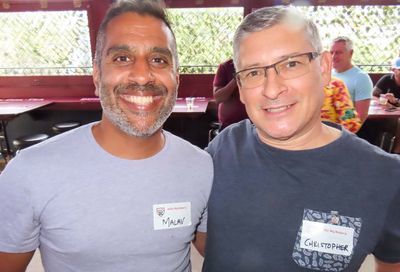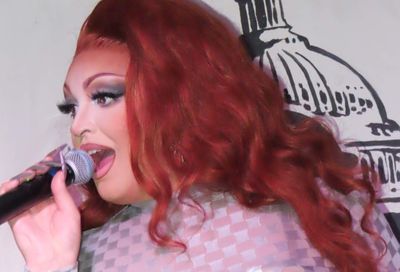Fourth Circuit Hears Virginia Marriage Case
Three-judge panel hears oral arguments in lawsuit challenging to Virginia's same-sex marriage ban

A panel of three judges in Richmond’s U.S. Court of Appeals for the Fourth Circuit today heard oral arguments in the case of Bostic v. Schaefer, challenging Virginia’s constitutional amendment banning same-sex marriage.
The ban, known as the Marshall-Newman Amendment and passed by a majority of Virginians via ballot initiative in 2006, was declared unconstitutional in February by Arenda L. Wright Allen, a U.S. District Court Judge for the Eastern District of Virginia. From there, opponents of marriage equality appealed it to the Fourth Circuit. The Fourth Circuit also allowed plaintiffs from a similar challenge mounted in Harrisonburg, in the Western District of Virginia, to intervene in the case. That case, Harris v. Rainey, was previously granted class-action status, thereby allowing other same-sex couples who wish to marry or have their existing out-of-state marriages recognized in Virginia to benefit from the same remedy – which, in this case, means the overturn of the marriage ban.
The lead plaintiffs in the Bostic case, Tim Bostic and Tony London of Norfolk, and Carol Schall and Mary Townley of Richmond, are represented by the legal duo of Ted Olson and David Boies, who successfully argued the case overturning California’s Proposition 8 marriage ban before the U.S. Supreme Court last year. Olson and Boies asked the Fourth Circuit Court to uphold Allen’s ruling and affirm that gays and lesbians in Virginia be allowed to marry. The three judges that heard Tuesday’s appeal were: Judge Henry F. Floyd, appointed to the Appeals Court by President Barack Obama; Judge Roger L. Gregory, a recess appointment of former President Bill Clinton who was later formally nominated by President George W. Bush; and Judge Paul V. Niemeyer, a George H.W. Bush appointee.
“Today, the Fourth Circuit heard precisely why our plaintiffs and gay men and lesbians across the country are entitled to exercise their fundamental right to marry,” Olson said in a statement following oral arguments. “Our plaintiffs have shared decades of love and commitment, and they desire nothing more than to have their home state recognize those relationships. Tim & Tony and Carol & Mary are asking the Fourth Circuit Court of Appeals to honor their fundamental freedom to marry and to treat them with equal dignity and respect under the law.”
“Our plaintiffs represent thousands of Virginians – and millions of Americans – who have been denied their fundamental right to marry the person whom they love,” Boies said in a statement. “These discriminatory laws excluding gay and lesbian couples from marriage violate their personal freedom and cause them and their families serious harm.”
Schall and Townley, who have been together for 28 years and were married in California in 2008, prior to Proposition 8, have a 16-year-old daughter, Emily Schall-Townley, who also spoke about the case’s impact on her family.
“It is my greatest hope that, because of today’s hearing, Virginia will finally acknowledge what everyone else already knows,” she said. “These are my two moms, and this is my family.”
“We have reached another historic milestone in the fight for marriage equality,” Adam Umhoefer, the executive director of the American Foundation for Equal Rights (AFER), the sole sponsor of the Bostic case, said in a statement. “I am hopeful the Court will uphold our District Court victory and affirm that every gay and lesbian American must be treated equally under the law. Denying a fundamental right to thousands of loving couples like our plaintiffs, and their families, is indefensible.”
The lead plaintiffs in the Harris challenge to the marriage ban, which was stayed by a federal judge pending a ruling the Fourth Circuit, also issued statements expressing hope that the Appeals Court will uphold Allen’s District Court ruling.
“We’re hopeful that we’ll finally be able to pledge our love to each other like any other couple that’s ready to make that commitment,” said Joanne Harris, of Staunton, who wishes to marry her partner of 11 years, Jessica Duff. “Jessi and I are completely devoted to each other, and it’s important to us and to our son that our family is recognized in Virginia with all the dignity and protections that only come with marriage.”
“All across the country courts are recognizing what a majority of Virginians already know – that it’s unfair to exclude same-sex couples from marriage,” said James Esseks, the director of the ACLU Lesbian Gay Bisexual and Transgender Project. “Today brings us one step closer to the day when all families are able to marry in their home states. Every family should know that they will be able to care for each other no matter what.”
There is also a possibility that the ruling of the Fourth Circuit, depending on its scope, could impact three other states under the court’s jurisdiction: North Carolina, South Carolina and West Virginia. On Monday, the heads of state LGBT organizations in those three states held a conference call with the commonwealth’s top LGBT organization, Equality Virginia, and said they were watching the ruling closely and consulting with legal experts to prepare for a variety of possible outcomes.
Meanwhile, outside the Appeals Court in Richmond, people from several local LGBT or allied organizations, including Equality Virginia and People of Faith for Equality in Virginia (POFEV), rallied to show their support for marriage equality and to stand in solidarity with the couples bringing the lawsuit. In addition to today’s demonstration, POFEV also held five rallies known as “Witnesses for LOVE!” on Monday across the commonwealth: in Winchester – which is home to the second set of Harris lead plaintiffs, Victoria Kidd and Christy Berghoff – in Christianburg, in southwest Virginia; in Harrisonburg; and two in Richmond, one of which was an overnight vigil outside the court.
“All of these events continue our statewide Witness for LOVE!,” POFEV’s president, the Rev. Robin Gorsline, said in a statement. “We are doing this because although we seek the legal right to marry for LGBT Virginians, our cause really is love – honoring all love as sacred, and working to share more love with all. We gather in love, because we know love changes the world!”
Virginia Attorney General Mark Herring, who announced earlier this year that he would not defend the state’s ban on same-sex marriage, appeared at a press conference with Stuart Raphael, the Solicitor General of Virginia, who presented the state’s case before the court during oral arguments. Herring referred to Tuesday as “a moment in history that should make Virginians proud.”
“Today, you heard the opponents of marriage equality make the best case they could, but just like in district court, their arguments were wholly unpersuasive,” Herring said. “Nothing that was said in the court room today alters the basic incompatibility of this discriminatory ban with the protections guaranteed by our constitution. And every single federal court that has considered the question since last summer’s Windsor decision has reached the same conclusion.”
“The constitution does not permit state laws to mark committed relationship between same-sex couples as deficient and inferior,” Herring continued. “As we have said repeatedly throughout this case, the issue is not the right to gay marriage or the right to straight marriage, it is just the right to marriage and all the responsibilities that come with it…I’m optimistic that the judges who heard today’s arguments will affirm the district court’s decision and recognize the equal rights of these couples and those like them throughout Virginia and our neighboring states.”
[Note: This story was updated to include comments from Virginia Attorney General Mark Herring.]
Support Metro Weekly’s Journalism
These are challenging times for news organizations. And yet it’s crucial we stay active and provide vital resources and information to both our local readers and the world. So won’t you please take a moment and consider supporting Metro Weekly with a membership? For as little as $5 a month, you can help ensure Metro Weekly magazine and MetroWeekly.com remain free, viable resources as we provide the best, most diverse, culturally-resonant LGBTQ coverage in both the D.C. region and around the world. Memberships come with exclusive perks and discounts, your own personal digital delivery of each week’s magazine (and an archive), access to our Member's Lounge when it launches this fall, and exclusive members-only items like Metro Weekly Membership Mugs and Tote Bags! Check out all our membership levels here and please join us today!





















You must be logged in to post a comment.